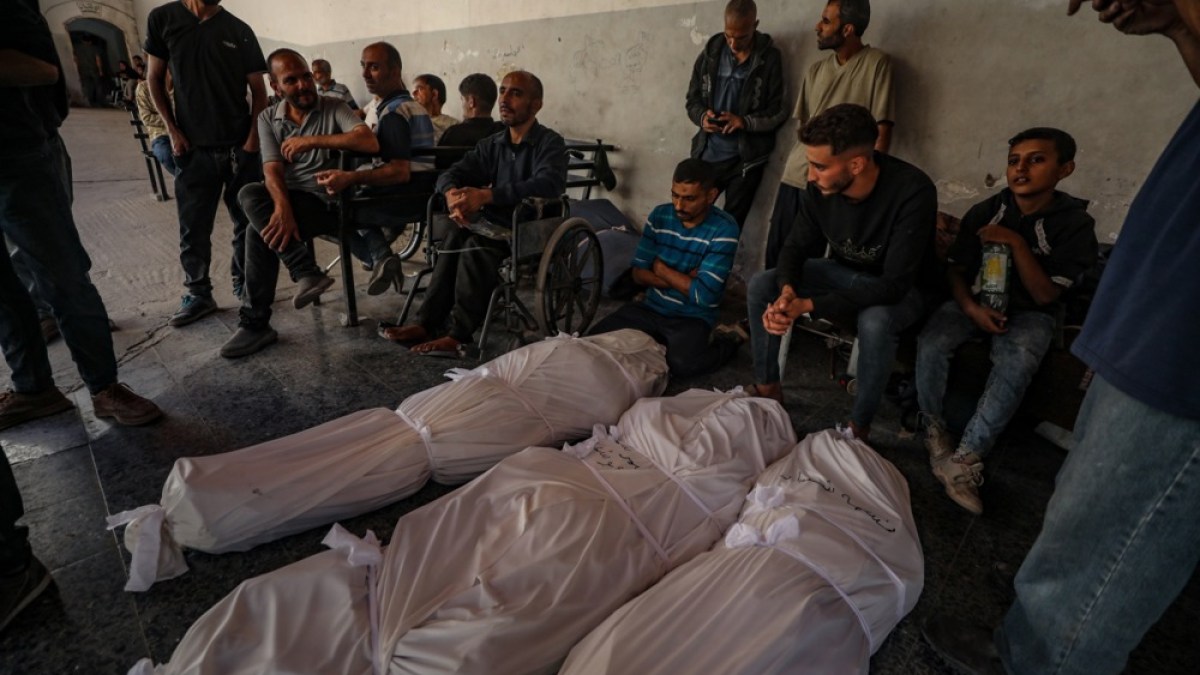Last Sunday, I left my family’s tent in az-Zawayda in the central Gaza Strip and headed for the nearby Twix Cafe, a co-working space for freelancers and students. Ten days had passed since the “armistice” had been declared, and I thought it must be safe for me to go out. Getting out was supposed to be a step towards reclaiming a small part of my old life.
My brother and I were almost at the cafe when we heard a very familiar sound – the thunder of an explosion. Israeli drones hit the entrance of Twix Cafe.
I froze. I thought, this is it – it’s my turn. I will not survive this war.
Three people were killed and many others were injured. If my brother and I had left my family’s tent a few minutes earlier, we might have been among the dead.
As the news spread, my family panicked and called us repeatedly. The signal was weak and their attempts to reach us were failing. It was only when we returned to the tent that we could console our mother.
I asked myself, what kind of truce is this? I felt more anger than fear.
When the Armistice Agreement went into effect and we were told by foreign leaders that the war was over, many of us dared to hope. We thought the explosions would finally stop, that we could rebuild our shattered lives without fear.
But Israel has no such hope. Violence never truly ends. That day, when Israeli forces bombed Twix Cafe, they bombed dozens of other locations throughout the Gaza Strip, killing at least 45 people and injuring many more.
It was the deadliest day since the ceasefire took effect. Not a day passed without loss of life; Israel continues to kill daily. More than 100 Palestinians have been killed since the so-called ceasefire was declared.
Among them were 11 members of the Abu Shaban family. The massacre took place on October 18, the day before the mass bombing. Abu Shaaban was trying to return to his home in the Zeitoun neighborhood of Gaza City in a vehicle. Israeli bombs ended the lives of four adults: Sufyan, Samar, Ihab and Randa; and seven children: Karam, age 10, Anas, eight, Nesma, 12, Nasser, 13, Jumana, 10, Ibrahim, six and Mohammed, five.
This is what Israel calls a “ceasefire”.
On Sunday, widespread firing spread panic and insecurity across the strip. As the explosions raged, people rushed to markets to secure as much food as they could afford in preparation for war and famine.
It was heartbreaking to see how people’s minds automatically turned to food during the bombing. It seems that we have forever lost the sense of security of knowing that we will have food on the table tomorrow.
And yes, we are still being forced to buy our food because Israel is not only violating the “ceasefire” by bombing us, but also withholding the aid it signed to allow. At least 600 aid trucks were supposed to enter Gaza every day. According to the Gaza Media Office, only 986 aid trucks have entered Gaza since the ceasefire took effect on October 11 – just 15 percent of what was promised. The World Food Program (WFP) has admitted only 530 of its trucks. No one is allowed.
Yesterday, a spokesperson for WFP said No major aid convoys have entered Gaza City; Israel still does not allow the agency to use Salah al-Din Street. Israel’s policy of starving northern Gaza is still in place.
The Rafah border crossing with Egypt – our only outlet to the rest of the world – remains closed. It is not known when it will reopen; when thousands of injured people will be allowed to cross for urgent medical treatment; when students are able to leave to continue their education; When families torn apart by war are reunited; When those who love Gaza – who have waited so long to come home – can finally return.
By now it is clear that Israel is treating this “ceasefire” like a switch – turning it on and off as it pleases. On Sunday, we started heavy bombing again, on Monday there was a “truce” again. As if nothing happened, as if 45 people were not killed, as if no houses were destroyed and no families were destroyed. It’s devastating to see your life being treated like it doesn’t matter. It is heartening to know that Israel can resume mass killings whenever it wants, without warning, without excuse.
This ceasefire is nothing more than a pause in what we now consider an endless war – a moment of peace that could end at any moment. Until the world recognizes our right to life and takes real action to secure it, we will be at the mercy of the murderous occupier. Until then, we will live in the headlines of Israel’s endless carnage.
The views expressed in this article are the author’s own and do not reflect the editorial position of Al Jazeera.

